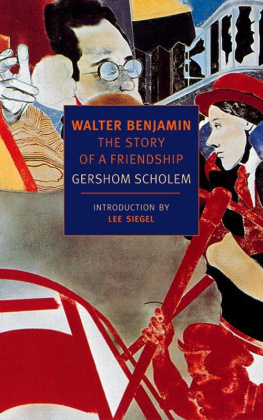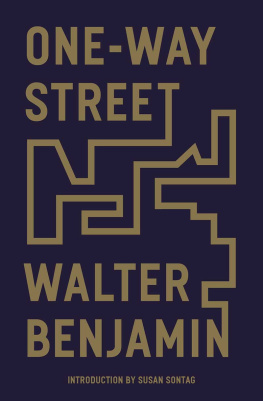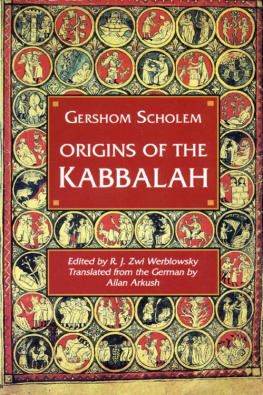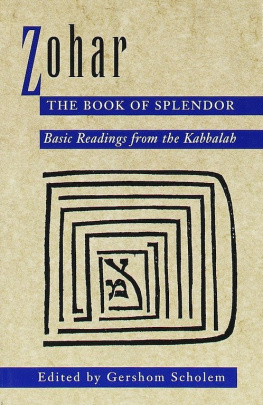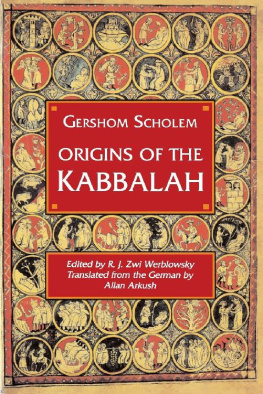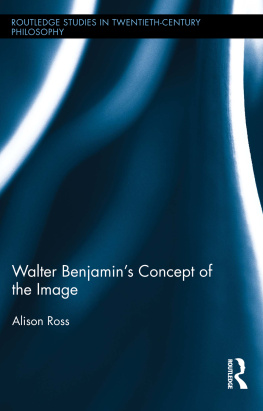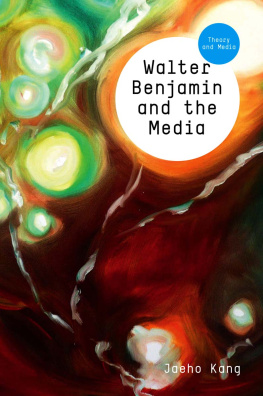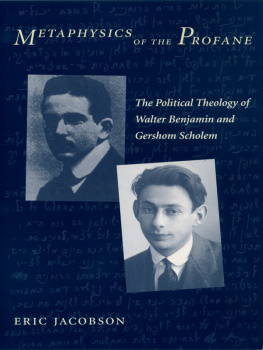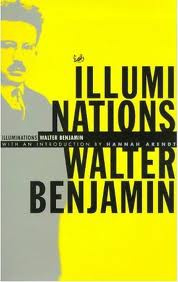GERSHOM SCHOLEM (18971982) was born in Berlin, educated at the universities of Jena and Bern, and emigrated to Palestine in 1923, where he devoted himself to the study of the Jewish mystical tradition and the Kabbala. One of the greatest scholars of the twentieth century, admired both for his philological prowess and his philosophical insight, Scholem was the author of many books, including Major Trends in Jewish Mysticism, On the Kabbalah and Its Symbolism, Sabbatai Sevi: The Mystical Messiah, and On Jews and Judaism in Crisis, a collection of autobiographical writings and essays on Zionism. The Correspondence of Gershom Scholem and Walter Benjamin and Gershom Scholem: A Life in Letters were published posthumously.
LEE SIEGEL is a critic and essayist living in New York City whose writing appears in Harpers, The New Republic, Time, The Atlantic Monthly, and The New Yorker, among other publications. He received the 2002 National Magazine Award for Reviews and Criticism.
WALTER BENJAMIN
THE STORY OF A FRIENDSHIP
GERSHOM SCHOLEM
Translated from the German by
HARRY ZOHN
Introduction by
LEE SIEGEL
NEW YORK REVIEW BOOKS
New York
CONTENTS
INTRODUCTION
B Y THE TIME Gershom Scholem, the distinguished authority on Jewish mysticism, published Walter Benjamin: The Story of a Friendship in Germany in 1975, the friendship in question had acquired symbolic proportions. The bond between the steady, sagacious scholar and the somewhat bizarre, utterly original homme de lettres had been nourished by thrilling intellectual frictions that lasted from their first meeting, in Berlin, in July 1915 to Benjamins suicide twenty-five years later at the FrenchSpanish border, where the refugee fleeing Hitler had been turned back by Spanish border guards. In the ensuing years, the two men themselves had become the subject of a large cultural and political argument. At the heart of the debate was Scholems insistence, maintained through essays and published letters to and from Benjamin, and culminating in this memoir, on the essentially religious nature of Benjamins personality.
In the Sixties, the European and American New Left had seized on Benjamins late Marxist turn and claimed him as the precursor of their emphasis on the ideological roots of cultural expression. Their urtext was the famous essay The Work of Art in the Age of Mechanical Reproduction, in which Benjamin declared art dead by the hand of bourgeois commodification, and then proclaimed it reborn as a critical occasion for the exposure of bourgeois illusions; their favorite quote was Benjamins remark that there is no document of civilization that is not at the same time a document of barbarism (his reworking of Balzacs behind every great fortune is a crime); their biographical proof of Benjamins political commitment was his devotion to his friend Bertolt Brecht. Benjamins martyr-like death provided the finishing touch, as it were, to this purposeful reconstruction of his life.
Walter Benjamin: The Story of a Friendship is partly a response to what Scholem believed was an outrageous misprision of Benjamin, and partly a resumption of an impassioned argument of his own with Benjamin over what Scholem considered his friends self-destructive foray into communism. In those years Scholem writes with quiet, vehement defiance, between 1915 and at least 1927the religious sphere assumed a central importance for Benjamin that was utterly removed from fundamental doubt.... God was real for Benjamin.... Yet reading this memoir, one also feels that Scholem regarded the picture of Benjamin the Marxist heroa man who, the memoir stresses, sometimes signed his letters Dr. Nebbishas a travesty of Scholems own most deeply held convictions, and of his most fateful choices, which had been formed in the crucible of his communion with Benjamin.
That communion had some of its origins in domestic dissent. For many Central European Jewish intellectuals, disaffection with their bourgeois or, as in Benjamins case, haute-bourgeois families created intense friendships that served as surrogates for discarded family connections. Like Kafka (whom both worshipedBenjamin just missed meeting him in Prague) and Kafkas beloved friend Max Brod, Scholem and Benjamin were in rebellion against their crude, successful, materialistic fathers, against their parents banal assimilationist Judaism, against the German-Jewish hallucination of wealth as the ingathering of the Diaspora. They escaped into shared passions for intellectual esoterica, such as their numerous conversations about laments and lamentations. (When, later in the book, Scholem mentions the biblical lament of David for Jonathan, it is an allusion to these same conversations. His memoir, one realizes, is a very artful piece of work, in which much is hidden between the lines because so much has been long understood between the author and his dead friend.) But the two young men found most of their relief from the parochial family atmosphere they despised in philosophy, history, and a mystical view of language that eventually led Scholem into the study of Jewish mysticism.
Scholem has a heavy intellectual stake in representing Benjamin as a figure driven by religious impulses, but he also demonstrates a profound devotion to Benjamin the person. He paints Benjamin in the full palette of his qualities and moods, without passing judgment but pressing a single emphasis. He wishes to present Benjamin as a man whose intellectual missteps followed, to a large extent, from a reckless indecision that was rooted in chronic depression: During my visit, we played chess several times. Benjamin played blindly and took forever to make a move.... Scholems Benjamin is egotistically morose, playful, authoritarian, wry, remarkably witty, compulsive, pliable, shrewd, hopelessly romantic, erotically ineffectual, sexually blocked, creatively sui generis, and an authentic genius. Scholem notes without irony the materialist basis for Benjamins dialectical materialismhe desperately needed money, and Marxists like Max Horkheimer and Theodor Adorno, through their Institute for Social Research, were willing to pay him for his essays. And yet he portrays Benjamins desperation without the slightest inflection of schadenfreude or triumph. He writes about Benjamin with a kind of awe, something like the way Benjamin himself (with an additional hint of comic Jewish resignation) saw history as one single catastrophe.
Still, on what he regards as the diverse sources of Benjamins communism, Scholem practices a restrained relentlessness. Reading The Story of a Friendship, one feels curiously that Benjamins Marxism represented for Scholem, among other things, a vestige of Benjamins upper-class complacency. (When the French placed Benjamin in an internment camp for a few months in 1939, Benjamin immediately gave to a disciple of his whom he found there a job as his personal secretary, valet, and porter.) It was Benjamins unwitting internalization of the very bourgeois materialism that alienated the two of them which itself sometimes alienated Scholem:
The enthusiasm with which [Benjamin] was capable of discussing bindings, paper, typefaces in those years frequently got on my nerves.... I saw an element of decadence in it.... I deny that metaphysically legitimate insights can arise from this way of evaluating books on the basis of their bindings and paper.
What Scholem prized in his friend he called, in the alpine idiom of German idealist philosophy, Benjamins metaphysicsi.e., his spiritual side. And it was Zionism that, for Scholem, offered the concrete fulfillment of metaphysics, and the only true alternative to onerous Kultur and coarse uncomprehending parents.
Scholem had become a Zionist when a teenager, and he emigrated to Palestine in 1923. His decision to immerse himself in scholarly investigation of the Kabbala functioned as a rejection of both the normative Jewish tradition and rationalist European culture, not to mention his father (... from age twenty-seven on I was able to devote all my energies to a field of research [Jewish mysticism] that my recently deceased father had deplored as unprofitable pursuits). After he left Germany, Scholem spent the next seventeen years trying to convince Benjamin to settle down in Jerusalem. With mounting urgency, he strove to persuade Benjamin that Europe was dead and rotting and the German-Jew a doomed oxymoron.
Next page
